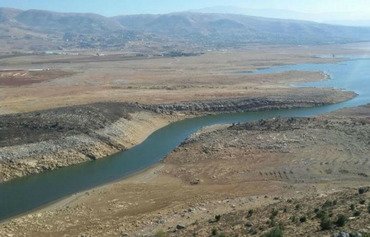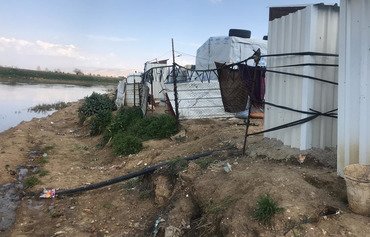Water pollution has been a persistent problem in Lebanon's Bekaa Valley, where in recent years the massive influx of Syrian refugees has placed increasing strain on the already insufficient infrastructure.
Water quality has steadily deteriorated in the Litani River as sewage seeps into the water from informal settlements in Bar Elias, Qab Elias and the Marj area, and from existing networks that are stretched beyond their capacity.
Industrial and animal waste and runoff that contains agricultural chemicals add to the long list of water pollutants that plague the river, which is one of Lebanon’s main water resources.
In response to the current situation, which poses a clear threat to public health, valley residents launched a campaign to demand government action.
![High Relief Committee secretary-general Maj. Gen. Mohammed Khair attends a mid-September meeting with protesters and politicians, where he announced that the wastewater treatment plant in Zahle would start working on October 10th. [Photo courtesy of the National News Agency]](/cnmi_am/images/2017/10/04/9770-Lebanon-Litani-river-600_384.jpg)
High Relief Committee secretary-general Maj. Gen. Mohammed Khair attends a mid-September meeting with protesters and politicians, where he announced that the wastewater treatment plant in Zahle would start working on October 10th. [Photo courtesy of the National News Agency]
The campaign, aptly titled, "I do not want the Litani to kill me", has seen heightened action in recent weeks.
On September 8th, protesters set up a tent on the Bar Elias-Chtaura highway and cut off part of the road, demanding the opening of a water treatment plant.
They displayed a banner with a message to the authorities that read: "We have given martyrs to the army to protect the country. Clean the river of death to protect the country. I do not want the Litani to kill me."
During a September 13th visit to the wastewater treatment plant in Zahle, High Relief Committee secretary-general Maj. Gen. Mohammed Khair promised that the new plant would become operational on October 10th.
Keeping the river clean
The Litani supplies the Bekaa Valley and a large portion of the south with water.
The Lebanese government must therefore "solve the problem of sewage to remove pollution from the Litani River", Zahle-Maalaka deputy mayor Antoine Bou Yunis told Al-Mashareq.
The municipality has handled the removal of sewage originating in the towns of Qaa al-Reem and Hazrata from the Berdawni River, which is now clean, he said.
As a further move, he said, the Council for Development and Reconstruction -- a Lebanese governmental organisation -- is working to connect the two towns to Zahle’s sewage network.
"We have done our duty, and other municipalities must do their duty to clean the river," he said.
"We were promised that on October 10th, the treatment plant in the area ... will start working," he added.
The treatment plant has been ready to be brought online for four years, he said, describing its activation as "a matter of political decision".
"If the towns along the river continue to dump their sewage water, the problem will remain," Bou Yunis said.
To address this problem, he said, the Council for Development and Reconstruction must execute projects to build wastewater treatment plants in other towns which have received government approval already.
Funding also must be provided to the al-Ferzol treatment plant so it can resume work, he added.
"Once all stations work simultaneously, we will once and for all remove pollution from the Litani River and from Bekaa Valley crops," he said.
Bekaa Valley crop contamination
Water pollution is "a chronic problem of the river in the absence of a comprehensive solution to it", said agricultural engineer Georges Zamar.
The problem has worsened with the arrival of Syrian refugees in large numbers in the Bekaa, he told Al-Mashareq, noting that sewage water originating from the random refugee camps that were set up by the river, is being dumped in it.
"The high pollution rate in the river has had an impact on crops in the Bekaa Valley, because a large proportion of farmers, even though they know about the pollution, irrigate the crops with water from the river," he said.
Sewage is not the only cause of crop pollution, he noted, as factories, slaughterhouses and hospitals that dump their solid waste and wastewater into the river also are a contributing factor.
This waste also penetrates into the groundwater that is used to irrigate crops.
The new wastewater treatment plant in Zahle will "reduce pollution, but will not fully handle it", Zamar said.
To fully solve the problem, he explained, all treatment plants along the river must be operational, "from its source to the west of Baalbek and to its estuary north of the city of Tyre in the south".
Water and sewage treatment
"The problem of pollution had been in place before Syrian refugees came to Lebanon," said Lisa Abu Khaled, assistant public information officer for the UN High Commissioner for Refugees (UNHCR).
The national water plan of 2010 "dealt with only 3% of the sewage problem, while 97% was dumped in nature", she told Al-Mashareq.
Lebanon is suffering from a chronic lack of infrastructure to treat the problem of sewage-originated pollution, she said.
"Since the beginning of the Syrian crisis, UNHCR has been supporting public institutions, executing water and sewage projects, and serving the Lebanese society and refugees alike," Abu Khaled said.
UNHCR, UNICEF and the Lebanese government have collectively spent $12,700,000 to treat water and sewage in informal refugee camps, she said.
UNHCR and its partners also have implemented 33 wastewater treatment projects in Lebanese communities.
In the camps, she said, sewage "is kept in temporary infrastructure that is cleaned periodically, to avoid dumping it in the river and in the areas surrounding the camps".
"We also organise periodic awareness campaigns for refugees on the dangers of water pollution from sewage," she said, adding that 96,000 people received information on this issue between January and June of this year.
These efforts can help with the problem of water pollution, she said, but cannot fully solve it.
"Addressing the problem of pollution of the Litani River requires joint efforts and requires the commitment of the state, civil society and donor states to reducing this impending threat to public health," she said.

![Garbage can be seen along the banks of the Litani River as it flows through the town of Qab Elias. The river is one of Lebanon’s main water resources, supplying the Bekaa Valley and a large portion of the south. [Photo courtesy of Badiat Qab Elias website]](/cnmi_am/images/2017/10/04/9769-Lebanon-Litani-river-600_384.jpg)






